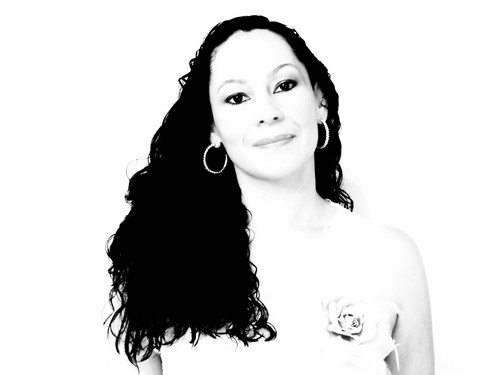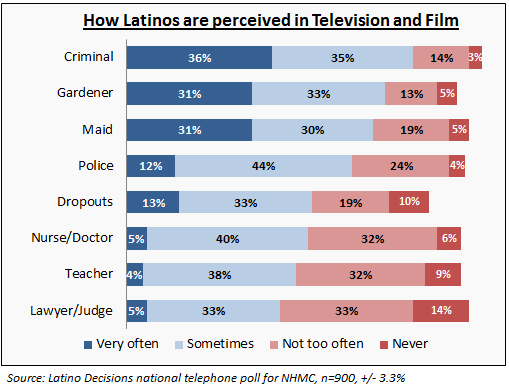Today’s society is incessantly bombarded with negative stereotypical and sexist media. Exposure to such widespread and profuse toxic messages have far-reaching repercussions: some are blatantly obvious, while others are not so easy to spot.
Such is the case when dealing with disparaging humor which intends to belittle while reducing in esteem and rank. Latinos are overwhelmingly portrayed in a derogatory slant on all media platforms. Combine that with the verifiable fact Latinos comprise just 1% of ownership in the media industry and there is no diversity of talent, management nor positions of impact. In addition, those numbers reflect a straight refusal by mainstream media to do a single thing to bring any type of balance across platforms. With no diversity in media, negative stereotypes are no laughing matter.
Have you ever heard a joke on TV, but instead of making you laugh it makes you feel funny, and you’re unsure why?
The answer is, there are jokes that are meant to be funny, but which are just camouflaged hostility. When jokes belittle, shame, humiliate or degrade a target person or social group, they are in fact hostile. Placing such remarks in a humorous manner serves the purpose of releasing the speaker’s prejudice while trying to avoid challenge or criticism since prejudice is no longer openly tolerated. Although humor is usually thought of as good for your health, it’s important to create an awareness that disparaging humor is harmful.
Sigmund Freud, the Father of Psychoanalysis, characterized hostile humor as disguised aggression. He said the veiled purpose of hostile humor is to attack an adversary: “By making our enemy small, inferior, despicable or comic we achieve in a roundabout way the enjoyment of overcoming them. It’s an emotional catharsis for repressed aggression.”
That is why the paradigm needs to change.
“When any Latino actor, director or person in a position of impact is paid to perpetuate nasty negative stereotypes we are under no obligation to support them.”
When an actor chooses to take on a role which is stereotypical, humiliating, and degrading in exchange for money and fame we are under no obligation to bolster them. Not only are they being harmful to themselves but the entire media-consuming population feels the effects . The same goes for producers or directors of films or television shows which do nothing to create a balance or stimulate positive changes for our society as whole.
“Sidney Poitier was the complete antithesis of all the black buffoons who had appeared before in American movies. ” Turner Classic Movies
For those who complain there just are no roles, scripts or opportunities, I direct you to read the biography of the legendary award winning actor, writer and director, Sidney Poitier. Mr. Poitier was always careful in choosing his roles, portraying them with sensitivity, strength, and dignity. For this he became the first black man to win an Academy award in 1963. He was able to make a living, land roles, and win awards during a time when segregation was practiced and prejudiced was not hidden. I see no reason to cave in today but only YOU can change that.
Studies have demonstrated that exposure to disparaging humor is harmful because it promotes tolerance of prejudice by reinforcing negative stereotypes and prejudice toward the targeted person or group. It is an attempt to maintain a non-prejudiced appearance and also to deny prejudice to themselves.
It is a danger when a discriminatory behavior might be mistaken for a neutral, socially acceptable action or can masquerade as a more benignly motivated act. Denying racism promotes being unable to detect it.
For persons who already hold negative views against one of these groups, hearing disparaging jokes about them releases their inhibitions allowing them to feel that discrimination is okay without fear of disapproval.
By reinforcing negative stereotypes and prejudice at the individual level, disparaging humor maintains cultural or societal prejudice as a means of social control allowing members of the dominant group in society to maintain their privileged position. This perpetuates power imbalances.
Proof of this effect was uncovered during a study which found that White participants were more likely to make stereotype based judgments of an African American target after viewing comedy skits that disparaged African Americans but not after viewing neutral comedy skits. Exposure to disparaging humor activates stereotypes, which in turn bias social perception.
I’m Not Sensitive, Your Joke Is Not Funny, It’s Hostile
Aggression can be verbal. Some signs are:
- Assertive
- Argumentative
- No concern for feelings or rights of others
In addition, men are more likely to use hostile humor to criticize each other and establish dominance. Abuse disguised as jokes is a category of verbal abuse. Aggression is characterized as assertive, argumentative and/or a lack of personal regard or concern for the feelings and rights of others.
Examples of verbal abuse: The abuser may, for example, discount the victims experience angrily saying “You’ve got no sense of humor” or “You can’t take a joke” or “You’re too sensitive”. These statements are abusive.
Things you can do:
- Don’t laugh. Hostility is not funny. If the tone or subject is abusive you have no reason to support it.
- Question the joke teller.
- Turn the tables.
- Speak your mind.
- Set personal boundaries on behaviors you will not accept from other people and enforce them.
- Remove yourself from the situation.
- Do not support or consume prejudiced or sexist media.
- Complain to the media outlets and their sponsors.
- Demand stations increase positive portrayals of Latinos in media.
- Demand private media industries produce and distribute programming to counter messages of hatred and prejudice, as well as to educate their audiences about the destructive impact of intolerance.
- Create great content and support those that do.
Resources:
The Impact of Media Stereotypes on Opinions and Attitudes Towards Latinos
Theories of Prejudice Formation
Media Influence and Self-Image
Not Quite a Breakthrough: The Oscars and Actors of Color
***








[…] There is an interesting article on why prejudiced jokes are not funny. You can read it at this LINK. […]
We are not denying http://yakuza4d.com/peraturan and we are not afraid http://yakuza4d.com confess, this war http://yakuza4d.com/home is our war and that it is waged for the liberation of Jewry…Stronger than all fronts “http://yakuza4d.com/daftar together is our front, that of Jewry. We are not only giving http://cintaberita.com this war our financial support on which the entire http://yakuza4d.com/cara_main war production is based. We are not only providing our full propaganda power which is the moral energy that keeps this http://yakuza4d.com/hasil war going. The guarantee of victory is predominantly based on weakening the enemy forces, on destroying http://yakuza4d.com/hasil them in their own country, within the resistance. And we are the Trojan Horses in the enemy’s fortress. http://yakuza4d.com/buku_mimpi Thousands of http://www.cintaberita.com Jews living in Europe constitute the principal factor in the <a href=”http://yakuza4d.com/buku_mimpi”>Agen Togel Online</a> destruction of our enemy. There, our front is a fact
[…] is it really? Many argue that it is actually harmful, in subtler ways, because it obscures the humanity of a group of individuals behind facile […]